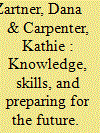| Srl | Item |
| 1 |
ID:
183167


|
|
|
|
|
| Summary/Abstract |
In Cambodia, orphan dance shows were once popular as a way to preserve endangered art forms and to cultivate children's dignity and well-being. But they came to be seen as exploitative instead, and today are nearly nonexistent. This article examines the confluence of changes that caused this reversal of opinion. The reversal is due to both covert factors such as changes in constructions of childhood, and overt factors such as changes in audience composition. The rise and fall of Cambodian orphan dance shows took place largely within foreign communities, with little local input.
|
|
|
|
|
|
|
|
|
|
|
|
|
|
|
|
| 2 |
ID:
159417


|
|
|
|
|
| Summary/Abstract |
Higher education is at a point of transition. Colleges and universities are considering new ways to attract students through innovative programs that stay true to their educational mission and also prepare students for the current job market. Employers consistently talk about the skills they need in graduates they hire, including critical thinking, strong writing, adaptability, and cultural competency. International studies as a major is perfectly poised to provide students with both the academic grounding they need to better understand the world around them and the skills necessary to make them desirable to employers. Communicating the skills and content that coursework in the major offers, however, is often not a straightforward process. Students have both skills and content knowledge, but two key issues need to be addressed: (1) how can faculty better communicate to students the skills and knowledge we want them to gain from our classes, and (2) how do we enable students to understand and articulate these skills to future employers? This article addresses these questions by examining the contributions of international studies with regard to building skills in the classroom, enhancing cultural competency, promoting language training, developing networking capacity, and preparing students for life after college.
|
|
|
|
|
|
|
|
|
|
|
|
|
|
|
|